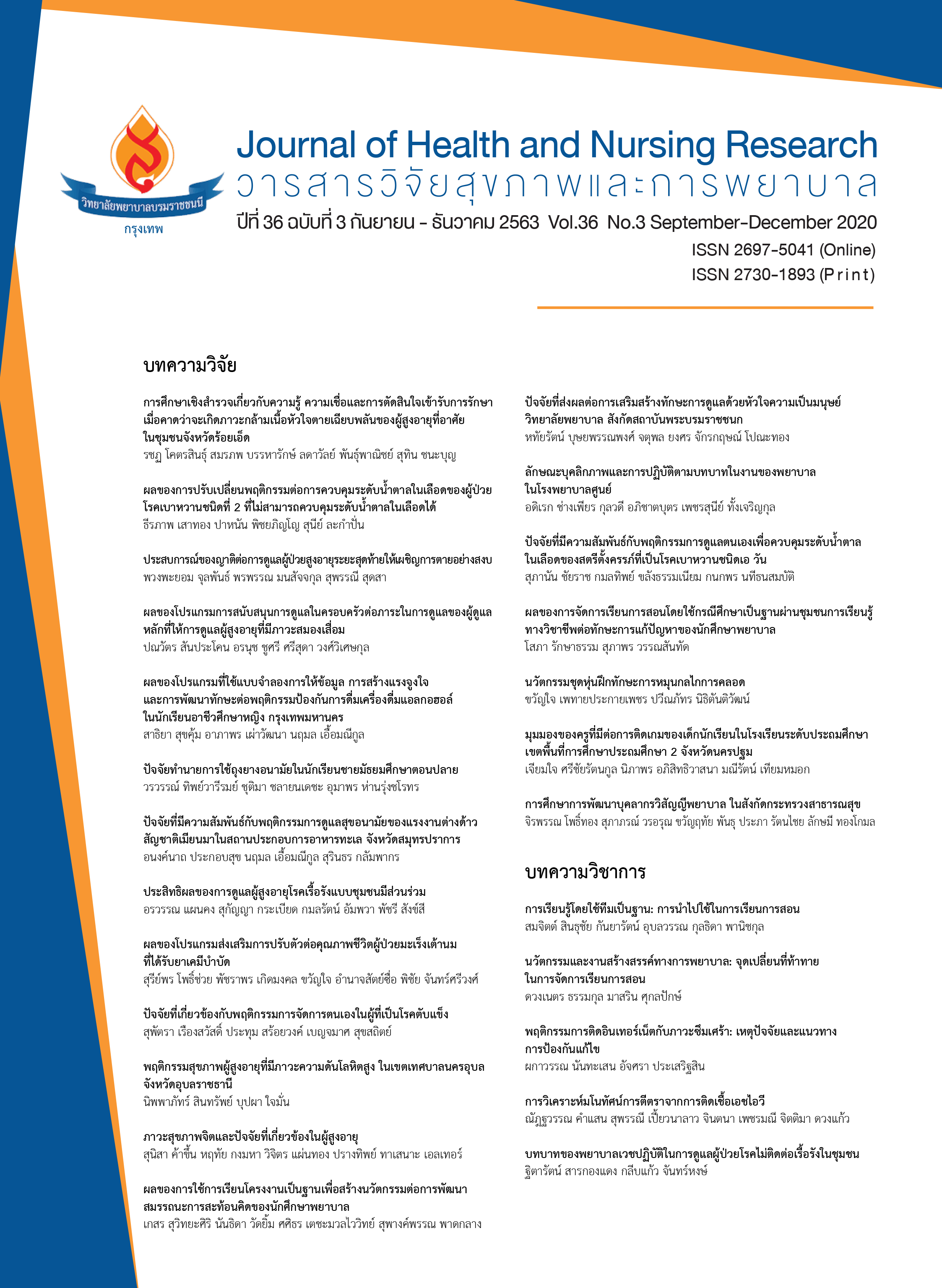ผลของการปรับเปลี่ยนพฤติกรรมต่อการควบคุมระดับน้ำตาลในเลือดของผู้ป่วยโรคเบาหวานชนิดที่ 2 ที่ไม่สามารถควบคุมระดับน้ำตาลในเลือดได้
คำสำคัญ:
โรคเบาหวานชนิดที่ 2, ทฤษฎีขั้นตอนการเปลี่ยนแปลง, ระดับน้ำตาลสะสมในเลือด, การรับประทานยา, การรับประทานอาหาร, การเคลื่อนไหวออกแรงบทคัดย่อ
การวิจัยเป็นรูปแบบการศึกษากึ่งทดลองมีวัตถุประสงค์เพื่อศึกษาผลของการปรับเปลี่ยนพฤติกรรมต่อการควบคุมระดับน้ำตาลในเลือดของผู้ป่วยโรคเบาหวานชนิดที่ 2 ที่มีระดับน้ำตาลสะสมในเลือดมากกว่าหรือเท่ากับร้อยละ 8 และรับการรักษาด้วยยารับประทาน ที่มารับบริการที่คลินิกโรคเรื้อรังในโรงพยาบาลส่งเสริมสุขภาพระดับตำบลในจังหวัดสุรินทร์ ได้กลุ่มทดลอง จำนวน 31 คน และกลุ่มเปรียบเทียบ จำนวน 32 คน โดยกลุ่มทดลองได้รับโปรแกรมที่ประยุกต์ทฤษฎีขั้นตอนการเปลี่ยนแปลงเป็นกรอบแนวคิดในการจัดกิจกรรม 4 ครั้ง ได้แก่ การสร้างความตระหนักและกระตุ้นให้ตื่นตัว ฝึกทักษะและการเสริมแรงด้านบวก ในขณะที่กลุ่มเปรียบเทียบได้รับการพยาบาลตามปกติ ทำการเก็บรวบรวมข้อมูลด้วยแบบสอบถามที่ระยะก่อนทดลอง ระยะหลังทดลอง สัปดาห์ที่ 8 และระยะติดตามผล สัปดาห์ที่ 12 และวิเคราะห์ข้อมูลโดยใช้สถิติ Independent t-test และ Paired Samples t-test
ผลการวิจัย พบว่า กลุ่มทดลองมีคะแนนพฤติกรรมในการควบคุมระดับน้ำตาลในเลือดเพิ่มขึ้นมากกว่าก่อนการทดลองทั้งในสัปดาห์ที่ 8 และ 12 และค่าความแตกต่างของคะแนนเฉลี่ยมากกว่ากลุ่มเปรียบเทียบในสัปดาห์ที่ 12 (p < .05) กลุ่มทดลองมีคะแนนการรับรู้ความสามารถในการควบคุมระดับน้ำตาลในเลือดเพิ่มขึ้นมากกว่าก่อนการทดลองในสัปดาห์ที่ 8 และ 12 (p< .05) แต่ผลต่างคะแนนเฉลี่ยไม่แตกต่างจากกลุ่มเปรียบเทียบทั้งในสัปดาห์ที่ 8 และ 12 และกลุ่มทดลองมีระดับน้ำตาลสะสมในเลือดลดลงกว่าก่อนการทดลองแต่ไม่แตกต่างจากกลุ่มเปรียบเทียบ (p> .05)
ข้อเสนอแนะการทำวิจัย คือ ควรเพิ่มระยะเวลาในการศึกษาเพื่อติดตามความคงอยู่ของพฤติกรรม และการลดลงของระดับน้ำตาลสะสมในเลือด พยาบาลเวชปฏิบัติชุมชนสามารถนำโปรแกรมการปรับเปลี่ยนพฤติกรรมต่อการควบคุมระดับน้ำตาลในเลือดของผู้ป่วยโรคเบาหวานชนิดที่ 2 ที่ไม่สามารถควบคุมระดับน้ำตาลในเลือดได้ ไปส่งเสริมให้เกิดการปรับเปลี่ยนพฤติกรรมสุขภาพของผู้ป่วยในชุมชนได้
Downloads
เอกสารอ้างอิง
2. Buse JB, Ginsberg HN, Bakris GL, Clark NG, Costa F, Eckel R, et al. Primary prevention of cardiovascular diseases in people with diabetes mellitus. Diabetes Care 2007;30(1):162-72.
3. Chatchalit R. The diabetes epidemic and impact on Thailand 2013 [Internet]. 2016 [cited 2016 April 17]. Available from: http://www.dmthai.org/briefingbook.pdf. (in Thai).
4. American Diabetes Association. Standard of medical care in diabetes. Diabetes Care 2016; 39(1):6-72.
5. American Diabetes Association. 6. Glycemic Targets. Diabetes Care 2017;40 (Supplement 1):S48-S56.
6. American Diabetes Association. Standards of medical care in diabetes-2017: Abridged for primary care providers. Clinical Diabetes 2017;35(1):5-26.
7. Nathan DM, Buse JB, Davidson MB, Ferrannini E, Holman RR, Sherwin R, et al. Medical management of hyperglycemia in type 2 diabetes: a consensus algorithm for the initiation and adjustment of therapy. Diabetes Care 2009;32(1):193-203.
8. Diabetes Association of Thailand under The Patronage of Her Royal Highness Princess Maha Chakri Sirindhorn. Guidelines for Diabetes Mellitus 2017. Bangkok: Aroonprinting; 2017. (in Thai).
9. Miller CK, Kristeller JL, Headings A, Nagaraja H, Miser WF. Comparative effectiveness of a mindful eating intervention to a diabetes self-management intervention among adults with type 2 diabetes: a pilot study. Journal of the Academy of Nutrition and Dietetics 2012;112(11):1835-42.
10. Al-Shookri A, Khor G, Chan Y, Loke S, Al-Maskari M. Effectiveness of medical nutrition treatment delivered by dietitians on glycaemic outcomes and lipid profiles of Arab, Omani patients with type 2 diabetes. Diabetic Medicine 2012;29(2):236-44.
11. Elhayany A, Lustman A, Abel R, Attal-Singer J, Vinker S. A low carbohydrate Mediterranean
diet improves cardiovascular risk factors and diabetes control among overweight patients
with type 2 diabetes mellitus: a 1-year prospective randomized intervention study. Diabetes,Obesity and Metabolism 2010;12(3):204-209.
12. Umpierre D, Ribeiro PA, Kramer CK, Leitao CB, Zucatti AT, Azevedo MJ, et al. Physical activity advice only or structured exercise training and association with HbA1c levels in type 2 diabetes: a systematic review and meta-analysis. Journal of the American Medical Association 2011;305(17):1790-99.
13. Colberg SR, Sigal RJ, Fernhall B, Regensteiner JG, Blissmer BJ, Rubin RR, et al. Exercise and type 2 diabetes. Diabetes Care 2010;33(12):e147-e67.
14. Prochaska JO, Diclemente CC, Norcross JC. In search of how people change: Applications to addictive behaviors. American Psychologist 1992;47(9):1102-14.
15. Arafat Y, Mohamed Ibrahim MI, Awaisu A. Using the transtheoretical model to enhance self-management activities in patients with type 2 diabetes: a systematic review. Journal of Pharmaceutical Health Services Research 2016;7(3):149-56.
16. Guicciardi M, Lecis R, Anziani C, Corgiolu L, Porru A, Pusceddu M, et al. Type 2 diabetes mellitus, physical activity, exercise self-efficacy, and body satisfaction. An application of the transtheoretical model in older adults. Health Psychology and Behavioral Medicine 2014;2(1):748-58.
17. Holmen H, Torbjornsen A, Wahl AK, Jenum AK, Smastuen MC, Arsand E, et al. A mobile health intervention for self-management and lifestyle change for persons with type 2 diabetes, part 2: one-year results from the Norwegian randomized controlled trial renewing health. JMIR mHealth and uHealth 2014;2(4):e57.
18. Partapsingh VA, Maharaj RG, Rawlins JM. Applying the Stages of Change model to type 2 diabetes care in Trinidad: A randomised trial. Journal of Negative Results in BioMedicine2011;10(1):13:1-8.
19. Yardley L, Morrison L, Bradbury K, Muller I. The person-based approach to intervention development: application to digital health-related behavior change interventions. Journal of Medical Internet Research 2015;17(1):e30.
20. Polit DF, Hungler BP. Nursing research principles and methods. Philadelphia. Lippincott Williams and Wilkins. 1999.
21. Hathaiporn C. Effects of program to promote diet and yoga-based exercise on glycemic control of patients with type 2 diabetes mellitus in Samutprakarn Province [thesis]. Bangkok; Mahidol University; 2013. (in Thai).
22. Bandura A. Social foundations of thought and action : A Social Cognitive Theory. Prentice-Hall : United States of America, 1986.
23. Kiernan M, Schoffman DE, Lee K, Brown SD, Fair JM, Perri MG, Haskell WL. The Stanford leisure-time activity categorical item (L-Cat): a single categorical item sensitive to physical activity changes in overweight/obese women. International Journal of Obesity 2013:37(12):1597-602.
ดาวน์โหลด
เผยแพร่แล้ว
รูปแบบการอ้างอิง
ฉบับ
ประเภทบทความ
สัญญาอนุญาต
บทความที่ได้รับการตีพิมพ์ เป็นลิขสิทธิ์ของวารสารวิจัยสุขภาพและการพยาบาล (วิทยาลัยพยาบาลบรมราชชนนี กรุงเทพ) ไม่สามารถนำไปตีพิมพ์ซ้ำในวารสารฉบับอื่น


















